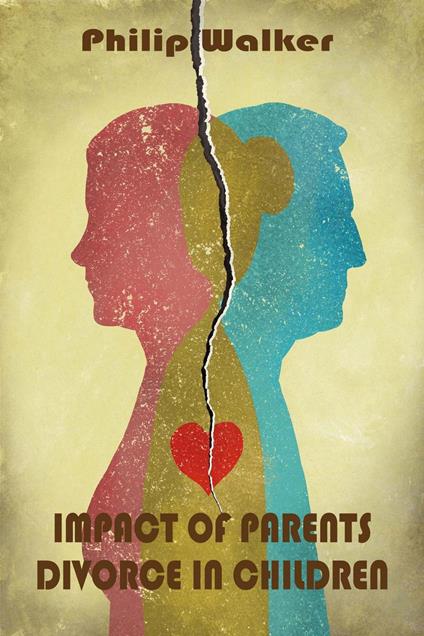Impact of Parents Divorce in Children
Divorce has been considered particularly disruptive for children because it occurs during childhood. While adults may have faced several losses and disappointments in life, the divorce of their parents is their first life crisis for many children. The distinctive feature of children of parental divorce is that they usually remain members of their parents' families, unlike their parents. This book considered the perspectives of children regarding their parents' divorce, paying particular attention to honoring the child's voice in the divorce process. The adult perspective on divorce has dominated the discourse on divorce, and research has only recently started to consider the viewpoint of children. Children are voiceless: they don't write books, don't vote, and don't usually get interviewed on television. We learn about their experiences by sensitively observing their lives. Later, when they are grown up, we ask them what it was like. Research has revealed that the nature of the divorce process as experienced by the child is the most critical factor in post-divorce adjustment. It also remains a relatively unexplored area, with only limited research on how children experience divorce. Parental divorce has been labeled as a substantial loss for all children affected. It is one of the most stressful events in the lives of children involved, with repercussions ongoing throughout these children's lives. As parental divorce transitions occur, children often experience depression, anxiety, anger, behavior problems, and a drop in school performance. Most researchers agree that children from divorced families are poorly adjusted in comparison to children from intact families. About 10% of children from intact homes present with psychological problems, behavioral problems, and academic difficulties in the South African context. These same problems are experienced by about 25% of children from divorced homes. About 70% of children from divorced homes view divorce as an acceptable solution to an unhappy marriage. The rise in global divorce rates has resulted in an increased focus on the impact of divorce on children. A large number of children affected by divorce and the increasing divorce rate in the world point to the need for research regarding children's experiences of parental divorce. This need is further emphasized by research findings regarding the impact of parental divorce on children. Psychologists agree that divorce significantly impacts children, despite disagreeing on the extent, nature, and intensity of this impact. Research on divorce has advanced dramatically over the past four decades. While a large amount of research has been conducted on the adult and adolescent perspectives regarding divorce, there is an increasing call for research on the child's perspective. Children of divorce do not have a voice in divorce research, which was the primary rationale for this book. It is not sufficient to simply research the divorce event itself. Still, the changes in the relationship between children and parents and the post-divorce family transitions should be considered essential research focus areas. It is also necessary to consider that parents separate for a period of time before they are divorced in most cases. Children who experience divorce are exposed to its adverse effects months or even years before the divorce event, often in the form of parental conflict.
-
Autore:
-
Anno edizione:2021
-
Editore:
-
Formato:
-
Testo in en
Formato:
Gli eBook venduti da Feltrinelli.it sono in formato ePub e possono essere protetti da Adobe DRM. In caso di download di un file protetto da DRM si otterrà un file in formato .acs, (Adobe Content Server Message), che dovrà essere aperto tramite Adobe Digital Editions e autorizzato tramite un account Adobe, prima di poter essere letto su pc o trasferito su dispositivi compatibili.
Cloud:
Gli eBook venduti da Feltrinelli.it sono sincronizzati automaticamente su tutti i client di lettura Kobo successivamente all’acquisto. Grazie al Cloud Kobo i progressi di lettura, le note, le evidenziazioni vengono salvati e sincronizzati automaticamente su tutti i dispositivi e le APP di lettura Kobo utilizzati per la lettura.
Clicca qui per sapere come scaricare gli ebook utilizzando un pc con sistema operativo Windows



